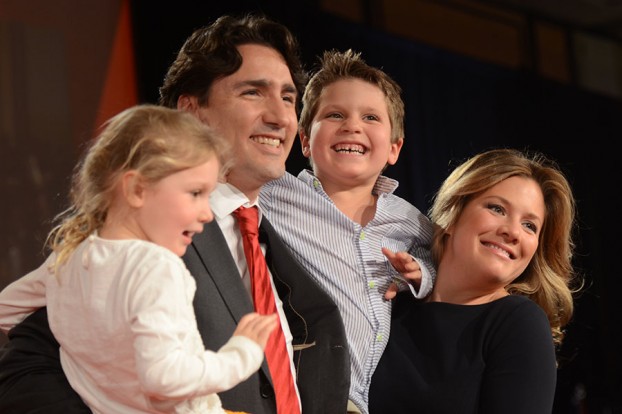Trudeau aims to end divisive politics in Canada

By Tyson Leonard
Once again a Trudeau will lead the federal Liberal Party. On Sunday Justin Trudeau took the stage for his acceptance speech and quickly condemned the current state of politics in Canada.
In his speech, Trudeau focused his criticism on what he called a culture of divisive politics encouraged by the current government under Prime Minister Harper, and the opposition under Thomas Mulcair. He went event further though, and criticized the divisive politics in his own party.
“Canadians turned away from us because we turned away from them, because Liberals became more focused on fighting with each other, than fighting for Canadians,” said Trudeau.
Trudeau said he would not tolerate so called ‘hyphenated liberals’ who fell into camps such as Martin-Liberals, Turner-Liberals, or Chretien-Liberals. Trudeau said it didn’t matter whether people thought his father was a great or arrogant, what mattered was that he would unite the party not just for unity’s sake, but for unity of purpose.
With 80% of the vote, Trudeau, who was the clear favourite, won the race in a landslide. He will now lead the defeated Liberal party into the next federal election in 2015.
Former Prime Minister Jean Chretien admitted in his speech that the Liberal Party has had its ups and downs, but that the new leader would bring about a renaissance within the Liberal party.
The Liberal leadership race was triggered when Michael Ignatieff resigned on May 3, 2011, after a resounding defeat in the federal election. With the defeat, the Liberals were knocked out of their official opposition party status, and replaced by the NDP under the leadership of Jack Layton. This was the first time the Liberals weren’t residing at either 24 Sussex Drive or Stornoway.
Bob Rae, MP for Toronto Centre, acted as the interim leader after Ignatieff’s resignation.
“There is no disgrace in being defeated the only disgrace is accepting defeat as a kind of permanent condition,” said Rae in a speech at the convention.
Federal Liberal Party President Mike Crowley boasted in his speech to the convention that more people have voted in this selection process than in any leadership race for any political party in Canada ever. Just over 127,000 people registered to vote and of those about 82% voted.
Trudeau said under his leadership the Liberal Party will focus on positive politics.
“We are fed up with leaders who pit Canadians against Canadians. West against East, rich against poor, Quebec against the rest of the country, urban against rural,” said Trudeau.
“Under my leadership the purpose of the Liberal leadership will be (the middle class).”
Trudeau has not outlined any specific policies, but has consistently rallied his supporters around messages of support for the middle class.
For some, Trudeau’s lack of policy highlights what they see as inexperience.
Marc Garneau ran in the Liberal leadership race until he dropped out in March. During the race he issued a challenge to Trudeau to define some of his policy.
“As Liberals, we cannot wait until after the leadership race is over to find out what we signed up for,” said Garneau in a post on his website.
The Conservative government is also likely to capitalize on Trudeau’s lack of policy. Trudeau once again said that he was certain positive politics would win out in the end.
“What I see is a lot of people responding to my message of hope and hard work, and wanting to see a positive approach to politics,” said Trudeau.
All of the speakers at the leadership convention mentioned the necessary hard work that would have to be done for the Liberals to get back into power. The first trial as a leader for Trudeau will undoubtedly be in Monday’s question period in the House of Commons where Liberals and non-Liberals alike will be looking to see if the new leader can hold his own.
 Print This Post
Print This Post






